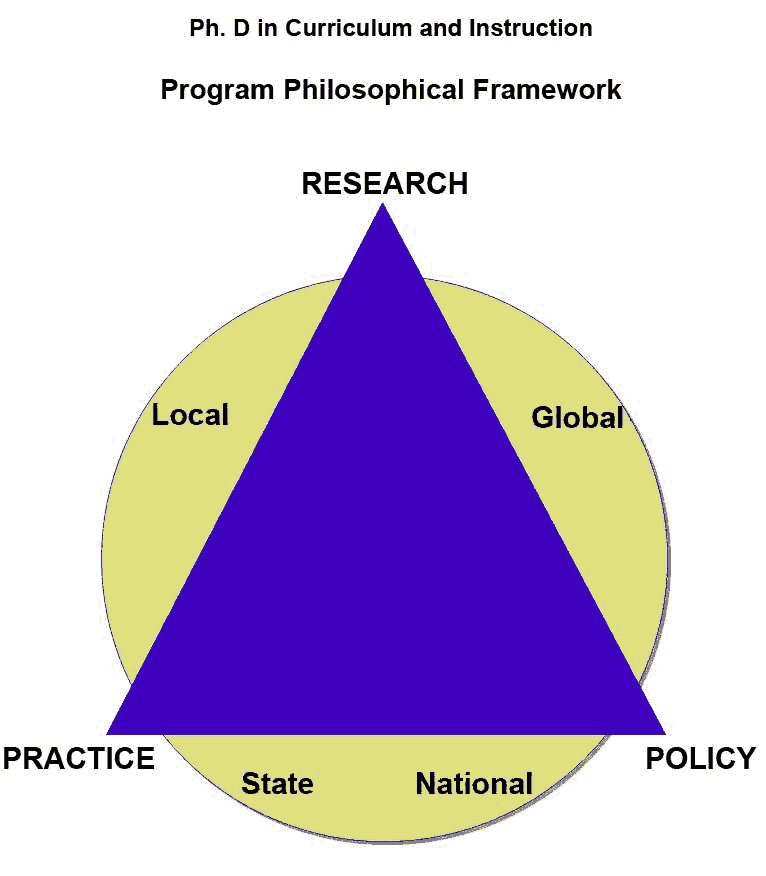Vision and Philosophy
Introduction
 The doctorate in Curriculum and Instruction (Ph.D. in C&I) is housed in the Department of Curriculum, Culture, and Educational Inquiry (CCEI) within the College of Education at Florida Atlantic University. CCEI is a newly formed department as of fall of 2007. Our goal is to maintain and sustain quality interdisciplinary collaborations with colleagues and students in many of the College Departments, including Teaching and Learning, Educational Leadership, and Special Education and to encourage our doctoral students to investigate courses and educational experiences throughout the College and the University as part of their graduate programs.
The doctorate in Curriculum and Instruction (Ph.D. in C&I) is housed in the Department of Curriculum, Culture, and Educational Inquiry (CCEI) within the College of Education at Florida Atlantic University. CCEI is a newly formed department as of fall of 2007. Our goal is to maintain and sustain quality interdisciplinary collaborations with colleagues and students in many of the College Departments, including Teaching and Learning, Educational Leadership, and Special Education and to encourage our doctoral students to investigate courses and educational experiences throughout the College and the University as part of their graduate programs.
The Ph.D. in Curriculum and Instruction faculty members acknowledge Florida Atlantic University’s unique role as a regional institution that must meet the need of local communities that span nearly 150 miles across FAU’s multiple campuses. Faculty and doctoral graduates, however, also recognize their roles nationally and internationally as they pursue their professional careers in education.
Our Ph.D. candidates are classroom teachers, district curriculum coordinators, and professors. Some of our candidates pursue specific content fields such as mathematics, science, English/language arts, social studies, or arts education. Others design areas of concentration that focus on fields such as professional development in content areas or technology. The Ph.D. program of study is structured, yet flexible enough to allow individuals to pursue their own inquiry and extend their professional expertise in ways most appropriate to their career goals.
The Ph.D. in C&I Program Philosophy
The Ph.D. in Curriculum and Instruction addresses core curriculum in three distinct arenas of the education field: Research, Practice, and Policy. In all three arenas, doctoral students are expected to be:
- Collaborators
- Consumers
- Critics
- Contributors
Research
Our doctoral program provides course work and field experiences that encourage and support students as collaborators in their inquiry and professional study. Doctoral students in our program are expected to read and interpret research with colleagues in their professional fields. As educational research consumers, they develop increasing ability to relate theory to practice and articulate the limitations and possibilities that research offers to practitioners. Students have multiple opportunities to serve as critics of theory and research in courses that consider quantitative, qualitative, and mixed methods designs used in education. Doctoral students also become contributors to their fields as they engage in original research, design and implement studies with faculty members and peers and ultimately complete the dissertation process. Candidates are encouraged throughout the program to apply their research, present for professional and public audiences, and submit written material for publication as scholars.
Practice
The Ph.D. in Curriculum and Instruction (Ph.D. in C&I) values practice and practitioners. Doctoral students share their professional work experiences as collaborators, by articulating the approaches, strategies, and research-based methods that constitute their success in classroom, building, district, and community contexts. Students investigate, as consumers, the practices that historically and currently frame content area teaching and learning. Many of them learn how to evaluate school and classroom programs, in addition to their investigations of how research results may apply to practice. They are encouraged to serve as critics of practices by examining micro and macro research studies and by examining their own lived experience. Through areas of concentration in their programs of study, doctoral students can also engage in internships, independent studies, and fieldwork to further inform their expertise. All educators are practitioners and in this doctoral program, students are supported as they reflect on their work and serve as contributors to the larger conversation about effective and responsive practices that address the needs of all learners.
Policy
It is not enough to engage successfully in personally fulfilling professional goals in this age of accountability and scrutiny of the educational process. Our doctoral students learn about how policy decisions are made and who makes them. Students act as collaborators in decision making for the purpose of improving the schooling experience for families, school personnel, and communities. Doctoral students become active inquirers into the political process at the local and state levels and investigate the roles that the federal government plays in educational policies and procedures. As such, they become informed consumers in the political process with respect to education as well as capable critics who are able to articulate how and why policies succeed or fail. The Ph.D. Program in Curriculum and Instruction provides multiple opportunities for doctoral students to study decision-making on the global level by analyzing educational policy issues in other countries. Students explore policy, research, and practice with perspectives on equity and access that are cornerstones of education. Internships and study abroad experiences further inform students' expertise in the policies and practices of education around the world. Doctoral students become contributors by their presence, their research, and their active integration of policy awareness in their own professional surroundings.